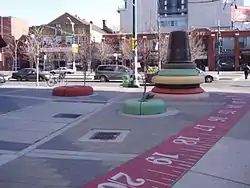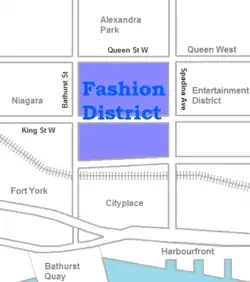Fashion District | |
|---|---|
Neighbourhood | |
 Symbols of the garment district. | |
 | |
| Country | |
| Province | |
| City | Toronto |
| Area | |
| • Total | 0.462 km2 (0.178 sq mi) |
| Population (2021)[1] | |
| • Total | 9,592 |
| • Density | 20,762/km2 (53,770/sq mi) |
The Fashion District (also known as the Garment District[2]) is a commercial and residential district in Downtown Toronto, Ontario, Canada. It is located between the intersection of Bathurst Street to the west, Spadina Avenue to the east, Queen Street West to the north and Front Street to the south.[3] Google Maps extends the district further east of Spadina Avenue to Peter Street.[4]
History
| Year | Pop. | ±% |
|---|---|---|
| 2011 | 3,949 | — |
| 2016 | 6,506 | +64.8% |
| 2021 | 9,592 | +47.4% |
The district's name is derived from the area's role in the garment industry. In the early 20th century, numerous textile and fabric factories and warehouses were located here due to the proximity and easy access to shipping and rail lines.[3] Garment enterprise owners commissioned the construction of multi-storey buildings to house their manufacturing operations.[5]

Once 80% of the city's Jewish community lived in the immediate area[2] resulting in the establishment of numerous Jewish delis, tailors, bookstores, cinemas, Yiddish theatres and synagogues. Many from this community worked in the garment industry.[3]
After World War II, much of that Jewish community moved further north, and the factories and warehouses began to be converted into other uses. Since the late 1980s, there has been extensive revitalization of the stretch of the Fashion District along Front Street between Spadina Avenue and Bathurst Street with disused railway land being reclaimed for high-end condominium, townhouse and retail development.[3]
Today
Today, many former garment warehouses house clothing outlets while others have been refurbished into artists’ studios and galleries, publishers, software and tech design offices and condos and lofts. The area is occupied by a mix of artists, musicians, designers, professionals and students.[3]
Future development
Seeing a spillover in condo developments from the adjacent Entertainment District, the Fashion District is starting to see an increase in the number of residential and multi-use developments.
Pemberton Group will develop 543 Richmond Street West on the corner of Portland. While details of the scope of the project have not yet been revealed, an early drawing from the city shows that the multi-phase project will have 476 units and 15 storeys per phase. A podium terrace will hold outdoor amenities which are yet to be determined. Toronto architecture firm Quadrangle will be responsible for the build.
One of the Fashion Districts many historical buildings will be demolished and replaced with condo developments. 73 Bathurst Street which occupies the block from Stuart to King along the east side of Bathurst Street will be torn down and developed by Timbercreek Developments, removing some of the neighbourhoods favourite small businesses including Banknote, and Grand and Clover Cocktail Co. It will still be a couple of years before this development begins but it is coming quickly just like many others.
See also
- Benjamin Brown (architect) who designed buildings for garment manufacturers in the Fashion District.
References
- ↑ GeoSearch
- 1 2 City Planning Department. "Queen Street District History" (PDF). City of Toronto. Retrieved 2016-02-25.
The section of Spadina between Queen and King Streets is known officially as the Garment District and more informally as home to the "rag trade." Once an area in which 80% of the city's Jewish population lived, Spadina today links the waterfront, with the Rogers Centre (formerly known as Skydome), Chinatown West and the University of Toronto. The area around Queen Street West continues to serve the garment industry.
- 1 2 3 4 5 "Fashion District". Property Guide Toronto. Archived from the original on 2016-03-04. Retrieved 2016-02-25.
- ↑ "Fashion District, Toronto, ON, Canada". Retrieved 2016-02-25.
- ↑ Dave Lebranc (18 February 2016). "Touring the Garment District designs of architect Benjamin Brown". The Globe and Mail. Retrieved 2016-02-18.